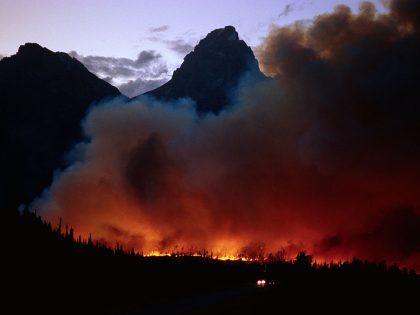
The War on Climate Change
Framing climate change as a national security threat risks inviting the conventional response: more militarism.
Page 1 of 24Next

Framing climate change as a national security threat risks inviting the conventional response: more militarism.

To build the power to take on climate change, we can’t simply validate individual movements or assume single-issue struggles will add up to something greater than the sum of their parts. We need class politics to connect the dots of our many struggles — and to save the planet.

By refusing to define “climate finance,” the United States and other wealthy nations are avoiding their responsibilities to fight climate change and forcing poorer nations into never-ending debt traps.
The spectacle of international climate negotiations shows that climate justice won't come through existing institutions.

The New York Times Magazine claims in a blockbuster new article that democracy and human nature are to blame for the climate crisis. They're wrong.

The 2010s were the decade when climate change stopped being an abstraction for millions of people in the rich countries. With extreme weather events presenting a grim picture of the future, suddenly politicians felt pressure to offer solutions — and young people started wondering how it would affect their own lives.

Naomi Klein on the crackdown against COP21 protesters and why "system change not climate change” is more than a slogan.

Reflecting the Trump administration’s priorities, the Environmental Protection Agency has now removed all information about climate change from its home page and other prominent areas of its website.

Companies have long been able to get away with funding climate change denial in secret. A new SEC rule could drag those dark-money donations into the open.

Recent footage from around the world showcases how the harrowing effects of climate change are pushing more people to migrate. But international law, stuck with Cold War–era persecution-based criteria, remains incapable of offering protection to climate refugees.

As the devastation of climate change is seen all around us, fossil-fuel companies are working overtime to avoid legal responsibility for the crisis — and offload the costs of environmental damage onto the public.

In 2014, Australian Labor PM Julia Gillard’s Clean Energy Act tried to use market mechanisms to take climate action. Its failure underscores the fact that only public investment in climate action will do.

A new report shows that the world’s top 1 percent is responsible for double the emissions of the entire bottom half of the planet. The message is clear: to fight climate change, we have to fight the ruling class.

The Trump administration worked hard to restricted and prevent shareholder actions and divestment strategies against fossil fuel industries. Reversing those rules under a Biden administration is key to defeating the planet's worst polluters.

Cuba, a small island besieged by the United States, is taking concrete measures to reorient its economy in the fight against climate change. It’s an example that the whole world should take seriously.

Thanks to its stubborn inaction on climate change, the conservative coalition was trounced in this weekend’s election in Australia. With Greens and independents set to hold the balance of power, it’s time for the climate movement to step up its demands.

Congress once passed major environmental regulation every single year, only to hardly pass any over the last 25. With the EPA recently hobbled by the Supreme Court, the only way to reverse climate change is to reverse the rot in Congress.

The price tag for enacting the most basic measures needed to mitigate climate change might seem steep — until you realize just how devastatingly expensive the natural disasters exacerbated by climate change are and will be very soon.

Lockheed Martin is the largest military contractor with the Department of Defense, the world’s largest institutional consumer of fossil fuels. Lockheed was recently asked point-blank if it will address its role in worsening climate change. Its answer: no.

In The Long Heat, Andreas Malm and Wim Carton take aim at what they call rationalist-optimists — people who naively believe that market solutions can fix the climate crisis. But their sweeping critique runs the risk of abandoning all hope in the future.